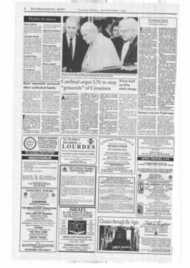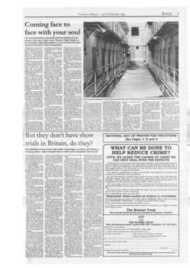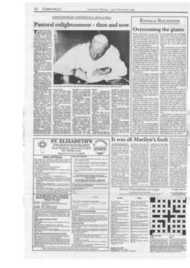Page 9, 19th November 1993
Page 9

Report an error
Noticed an error on this page?If you've noticed an error in this article please click here to report it.
Tags
Share
Related articles
Students At Wonersh Wrestle With
A Priest: Less Academia, More Care
Vocations Talks
No Complacency At The English College
Training Given In Seminaries Is Praised
Keeping standards up: the obstacle course to priesthood
They're not trying to find the Archangel Gabriel, but the selection procedure for modern candidates to the priesthood is as tough as it has ever been. Murray White talked to staff and students at St John's seminary in Wonersh to find out just how tough
WjELAT IS THE toughest ob to apply for? A doctor? Lawyer? Civil servant? International stock market dealer? Answer: probably none of these. The shrewd money these days must be on the (not-so-) common or garden priest. In fact, if the selection process that an increasing number of dioceses are adopting is anything to go by, it is perhaps a wonder that the Church has any new ordinands at all. Even Mgr Peter Smith, the Rector at St John's Seminary, Wonersh, is only half joking when he admits that he wouldn't have survived the selection procedure if he had applied to his own seminary today.
One myth about how seminarians are selected should be dispelled from the outset that a man receives a visionary flash from God, and finds himself in formation mere weeks later, pausing only for a wee chat and approving nod from his bishop. Rather, today's pastor-in-waiting must undergo nothing less than an ecclesial Krypton Factor :hallenge.
One young seminarian, Dominic liaise, has jumped 1 particularly tough hurdle :o reach the first year at Nonersh. Aged 19 when he irst applied to study for the ,riesthood three years ago, 3ominic was referred to a -wo-year pre-seminary :ourse at Campion House ,n Middlesex, mainly for academic reasons. Only after successfully negotiating this "sort of military training camp", as he rails
it, was he able to take up a seminary place. And he still faces five more gruelling years of training before he can be ordained.
"Becoming a priest, I guess, is something I've always wanted to do from about the age of eight. But when I asked at 19 exactly why I wanted to, and lots of other questions about myself that I'd never been
asked before, I couldn't answer all of them off the top of my head," he explains.
Fellow student, Simon Hill, 23, admits that apply big to the priesthood was nothing like applying for any other job. "With this you have to put your whole life on hold for at least six months. This isn't the kind of thing you do lightly."
It is little wonder that most churchgoers know little of the process of clergy selection. Attracting voca tions is difficult enough these days without adver tising the spiritual and psychological obstacle course that must be negotiated before the real training can even begin.
Although it varies according to academic qualifications, age, and maturity, the actual process (for a diocesan priest as opposed to one from an order) goes something like this: 1. First point of contact is a diocesan vocations director, who will conduct a preliminary interview. lithe applicant is too young, for example the minimum age for ordination is 25, so seminaries don't usually accept below 20 he could advise taking a few years further to consider, or recommend some pastoral work to show some commitment. Candidates fresh out of school are not encouraged.
2. The bishop will then conduct an interview of his own. All through this time, senior clergy are looking for a basic intellectual capacity and a genuine reflection on the sense of vocation.
3. The bishop will then decide to send a promising candidate to a weekend Selection Conference Wonersh had the first in 1971 and most bishops rely on their assessment.
4. During the Wonersh weekend (others are similar), interviews are conducted by a priest (who covers faith, prayer and the demands of clerical life including celibacy), a lay man (on academic background, communication skills and other interests) and a woman (usually a trained counsellor who considers personal qualities and family background). A psychological assessment, medical test, and various informal group interviews also take place.
5. The interviewers then decide on a recommendation to make to the bishop.
Charles Howell, another Wonersh first-year, was one of 17 young men at the seminary's 1992 Selection Conference. Now two months into his first year of study, the Cambridge graduate looks back on the experience as something that "strengthened" his existing sense of vocation. "It was useful having a variety of interviews. If you just have one, sometimes there could be a personality clash," he says.
But, in the pursuit of the most suitable candidate that special man who has the potential to be a wise shepherd of the people has the process become too rigorous, too reliant on complicated interview techniques and character studies? In short, is there an over emphasis on the psychological at the expense of the spiritual?
In his sunlit office at Wonersh, a peaceful few miles from the bustling Surrey commuter town of Guildford, Mgr Smith is quick to rebuff such suggestions, although he recognises the dangers. "Above all, we are always looking for someone who has a faith," the rector says. "You could have an atheist go through the academic or psychological process and come out on top, but they obviously wouldn't be the best prospect."
But he also stresses, there is no such thing as an ideal candidate:" We are looking for someone who is well adjusted, mature, and has the potential for formation. We are not looking for the Archangel Gabriel."
In a changing environment, with increasingly complex demands on the modern priest, the Church has to be sure of the qualities of those she chooses. If the standard of applicants in a given year is poor, there is no attempt to "keep numbers up" Mgr Smith maintains, even if, as has happened in recent years, that leads to fears of a "vocations crisis". A few years ago, one bishop was not pleased when all his candidates were turned away.
When a candidate is deemed unsuitable and only around two-thirds of those who attend a selection conference are recom
mended immediately their bishop will be told why. He might not agree with their verdict indeed, the final decision still remains the responsibility of the prelate. But the affable Rector is not being arrogant when he adds that, "in almost every case, where we say 'no', and the bishop does not agree with us, the candidate leaves before ordination. We are not infallible, but it is generally unwise for the bishop not to acknowledge the recommendation of the conference."
Reasons for "failing" selection are legion. An immature attitude to sexuality if, say, celibate priesthood is seen as an escape is one problem.
A far greater concern is voiced by Mgr Smith: "30 years ago the Church and society were very stable. One of the 'big problems now is the one people have making and keeping a lifelong commitment. There is no way of guaranteeing that."
The possible arrival of dozens of Anglican converts over the next few years could throw up other dilemmas. Seemingly little thought has been given to the potential problems of married and celibate studying alongside one another, and it has still to be worked out what arrangements are needed if a "fast-stream" formation is adopted.
A general challenge for the future is also emerging. Wonersh, for one, has only 37 students this year back in the 1960s, it had more than 100.
Development of the selection process cannot be the sole concern of the seminaries and vocations directors. Mgr Smith gave a small but sober reminder that "catching" a vocation is only half the battle. "Keeping" one can be just as tricky. Since term began at Wonersh in September, two men have already left admittedly for very different and unavoidable personal reasons.
With such a pattern reflected in seminaries elsewhere, vocations directors cannot afford to put all their selection eggs in one basket.
blog comments powered by Disqus













